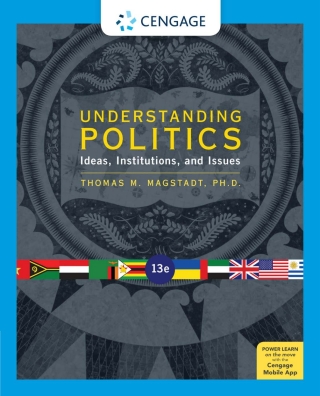Buy Understanding Politics: Ideas, Institutions, and Issues, 13th Edition PDF ebook by author Thomas M. Magstadt – published by Cengage Learning in 2021 and save up to 80% compared to the print version of this textbook. With PDF version of this textbook, not only save you money, you can also highlight, add text, underline add post-it notes, bookmarks to pages, instantly search for the major terms or chapter titles, etc.
You can search our site for other versions of the Understanding Politics: Ideas, Institutions, and Issues, 13th Edition PDF ebook. You can also search for others PDF ebooks from publisher Cengage Learning, as well as from your favorite authors. We have thousands of online textbooks and course materials (mostly in PDF) that you can download immediately after purchase.
Note: e-textBooks do not come with access codes, CDs/DVDs, workbooks, and other supplemental items.
eBook Details:
Full title: Understanding Politics: Ideas, Institutions, and Issues, 13th Edition
Edition: 13th
Copyright year: 2021
Publisher: Cengage Learning
Author: Thomas M. Magstadt
ISBN: 9780357137444, 9780357137437
Format: PDF
Description of Understanding Politics: Ideas, Institutions, and Issues, 13th Edition:
“Politics is a gateway to a broader and better understanding of human nature, society and the world”” is the inspiration behind Magstadt’s UNDERSTANDING POLITICS: IDEAS, INSTITUTIONS, AND ISSUES. Thoroughly updated, the 13th Edition provides in-depth coverage of contemporary political issues and places them in the context of more enduring underlying questions. It analyzes three fundamental premises: Politics is a pervasive force in modern society; government is too important to be left in the hands of a few; and the right to participate in public life is a precious thing unique to republics. Coverage includes key concepts like democracy, ideology, citizenship, voting behavior, public policy, leadership and foreign policy, along with analysis of the Trump presidency, social media in politics, Russian interference in Western elections, Brexit, the rise of China as partner and rival and more.Important Notice: Media content referenced within the product description or the product text may not be available in the ebook version.
Table of Contents of Understanding Politics: Ideas, Institutions, and Issues, 13th Edition PDF ebook:
ContentsPrefaceAbout the AuthorChapter 1: Introduction: The Study of PoliticsWhy Study Politics?Basic Concepts of PoliticsThe Problem of Dirty HandsHow to Study PoliticsSummaryKey TermsReview QuestionsWebsites and ReadingsChapter 2: The Idea of the Public Good: Ideologies and IsmsPolitical Ends and MeansIdeologies and the Public GoodIdeologies and Politics in the United StatesSummaryKey TermsReview QuestionsWebsites and ReadingsPart 1: Comparative Political Systems: Models and TheoriesChapter 3: Utopias Model StatesPlato’s Republic: Philosophy Is the AnswerFrancis Bacon’s New Atlantis: Science Is the AnswerKarl Marx’s Classless Society: Economics Is the AnswerB. F. Skinner’s Walden Two: Psychology Is the AnswerUtopia RevisitedDystopia: From Dream to NightmareSummaryKey TermsReview QuestionsWebsites and ReadingsChapter 4: Constitutional Democracy: Models of RepresentationLiberal Democracy: Models and TheoriesRepublics and ConstitutionsBottoms Up: The Idea of AmericaFour Models of American DemocracyTocqueville: The Tyranny of the MajorityJohn Locke: The Rule of LawConstitutionalism and Due ProcessRemodeling Democracy: Have It Your WayDemocracy in America: Broken and beyond Repair?The Future of DemocracySummaryKey TermsReview QuestionsWebsites and ReadingsChapter 5: The Authoritarian Model: Myth and RealityThe Virtues of Authoritarian StatesThe Vices of Authoritarian RulersThe Benevolent Dictator-Fact or Fantasy?Characteristics of Authoritarian StatesThe Politics of AuthoritarianismAuthoritarianism in Practice: A Tale of Two StatesAuthoritarianism in Theory: Myth versus RealityThe Future of AuthoritarianismAuthoritarianism and U.S. Foreign PolicySummaryKey TermsReview QuestionsWebsites and ReadingsChapter 6: The Totalitarian Model: A False UtopiaThe Essence of TotalitarianismThe Revolutionary Stage of TotalitarianismThe Consolidation of PowerThe Transformation of SocietyThe Human Cost of TotalitarianismThe Sanguinary ImitatorsTwilight of Totalitarianism?SummaryKey TermsReview QuestionsWebsites and ReadingsPart 2: Established and Emerging DemocraciesChapter 7: Parliamentary Democracy: Pros and Cons of Perishable GovernmentsGreat Britain: Mother of All ParliamentsFrance: President versus ParliamentGermany: Federalism against MilitarismJapan: Between East and WestIndia and Israel: Challenged DemocraciesThe Adaptability of DemocracyParliament or President? A Brief ComparisonSummaryKey TermsReview QuestionsWebsites and ReadingsChapter 8: Democracy or Dictatorship?: Transitional Systems Yesterday and TodayRussia: Old Habits Die HardEastern Europe: Democracy on Life Support?Asia: Where Democracy Goes to Die?Latin America: Rebirth of Democracy?SummaryKey TermsReview QuestionsWebsites and ReadingsChapter 9: Problems of Development: Progress and Poverty in a Global AgeDevelopment as IdeologyThe Idea of DevelopmentThe Legacy of ColonialismNation-State Newbies: Four ChallengesThe Strategy of DevelopmentNigeria versus India: Two Case Studies, One RiddleObstacles to DevelopmentFailed StatesDevelopment: Tonic or Elixir?SummaryKey TermsReview QuestionsWebsites and ReadingsPart 3: Politics by Civil Means: Citizens, Leaders, and PoliciesChapter 10: Political Socialization: The Making of a CitizenThe Good CitizenPolitical Culture: Defining the GoodPolitical Socialization: Forming CitizensSocialization and Political BehaviorWhen Political Socialization FailsSummaryKey TermsReview QuestionsWebsites and ReadingsChapter 11: Political Participation: The Limits of DemocracyDefining ParticipationWho Votes for What, When, and Why?Participating as a Spectator: OutsidersParticipating as a Player: InsidersParticipation and Political PartiesParticipation and Interest GroupsThe Internet: Power to the People?The Public Interest: Pushover or Pushback?SummaryKey TermsReview QuestionsWebsites and ReadingsChapter 12: Political Leadership: The Many Faces of PowerThe Ideal LeaderWorld Class Leaders in HistoryWhere Have All the Leaders Gone?Demagogues in American HistoryOrdinary PoliticiansLegislatorsCitizen-LeadersSummaryKey TermsReview QuestionsWebsites and ReadingsChapter 13: Issues in Public Policy: Politics, Principles, Priorities, and PracticesThe Pursuit of SecurityThe Pursuit of ProsperityThe Pursuit of EqualityThe Pursuit of LibertyThe Pursuit of JusticeGoals in ConflictSummaryKey TermsReview QuestionsWebsites and ReadingsPart 4: Politics by Violent Means: Revolution, War, and TerrorismChapter 14: Revolution: In the Name of JusticeThe Frequency of RevolutionsModern Revolutions: Two TraditionsRevolution-A Right or All Wrong?The Causes of RevolutionSummaryKey TermsReview QuestionsWebsites and ReadingsChapter 15: War: Politics by Other MeansThe Causes of WarIn Search of a Definitive TheoryTotal War: Wars Everybody FightsAccidental War: Wars Nobody WantsNuclear War: Wars Nobody WinsProxy Wars: Wars Others FightJust Wars: Wars Others StartA War on What? The Politics of HyperboleWeapons of Mass Disruption: CyberwarWar and DemocracyWar and DiplomacySummaryKey TermsReview QuestionsWebsites and ReadingsChapter 16: Terrorism: War or Crimes or War Crimes?What Is Terrorism?The Origins of TerrorismTerrorist or Freedom Fighter?Terrorism and SocietyCountering TerrorismThe Terrorists among UsCan Terrorism Be Defeated?SummaryKey TermsReview QuestionsWebsites and ReadingsPart 5: Politics without GovernmentChapter 17: World Politics: The Struggle for PowerGet Real! Machiavelli and MorgenthauBirth of the Modern World OrderThe Cold War Bipolar System: 1945-1991After the Cold War: Return to MultipolarityU.S. Foreign Policy: From Truman to TrumpStatecraft: Beyond RealismThe More Things Change . . .SummaryKey TermsReview QuestionsWebsites and ReadingsChapter 18: International Law and Organization(s): The Quest for World OrderNonstate Actors on the World StageThe European UnionThe United Nations: Our Mirror in a MirrorUnconventional Nonstate ActorsInternational LawThe Quest for World PeaceSummaryKey TermsReview QuestionsWebsites and ReadingsAfterword: The Power of KnowledgeEndnotesGlossaryIndex





